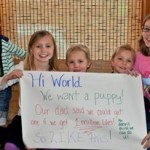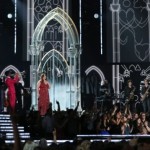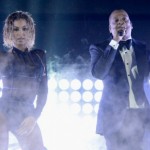The response of musicians to two recent tragedies and the Christian responsibility to do justice through music.
Each Tuesday in Music Matters, Matthew Linder looks at happenings in the music realm and why they matter.
Can music do justice? We might think that moments of seeking justice through music are rare but when disaster strikes, music is always the first to respond. In the 1980’s, musicians participating in Live Aid and USA for Africa’s “We Are the World” raised hundreds of millions of dollars for Ethiopian famine relief. This week we remember the civil rights movement of the 1960’s and at so many of the protests, including the March on Washington, a song, “We Will Overcome”, led the way. Stretching further back to the early days of Protestantism, Luther and his followers sang at protests, “A Mighty Fortress is Our God” defending their faith and changing the face of Christianity forever. A few weeks after the twin towers fell, musicians gathered at the Concert for New York City raising $30 million for families of the victims of the attacks but ultimately, they brought healing to a nation through song. Therefore, it is not surprising to find music yet again at the forefront of helping those affected by two recent American tragedies—Hurricane Sandy and the Sandy Hook School shooting.
Musicians of all genres and locales across the country have gathered their resources together to host a plethora of benefit concerts for both incidents. However, the 12.12.12 Sandy Benefit Concert featuring Bruce Springsteen, Bon Jovi, Paul McCartney, The Rolling Stones, Roger Waters, Kayne West, Alicia Keys, Chris Martin and many others was the most publicized and financially effective. Ticket sales for the concert raised $50 million and donations continue to come in as the funds are being funneled to the communities devastated by Hurricane Sandy.
Bruce Springsteen, no stranger to the benefit concert, opened with songs of hope, leading an audience impacted by Superstorm Sandy in songs of healing. His song “My City of Ruins” engrained in the American psyche as the song of 9/11, he reappropriated within the context of this disaster, calling it “a prayer.” The other New Jersey natives, Bon Jovi, likewise with their performance were able to bring the audience to their feet as they shouted down the horrors of the storm in the jubilant choruses of 80’s hair metal. In between, Roger Waters took the melancholic refrains of Pink Floyd and as he recently remarked on The Daily Show of Floyd’s “The Wall”, “It’s no longer about that miserable, self-serving, sniveling, nasty little Roger we hated all those years ago. It’s more about . . . the rebellion that is trying to understand the world and, if possible, help people occasionally.”
http://youtu.be/fOmn9iWcG5g
While the overall musical response to Hurricane Sandy was pure musical triumphalism, the reaction to the Sandy Hook shooting took an entirely different tone. It was not “we will overcome, we will rebuild” but “how could this happen, what can we do to stop this from happening ever again?” A quick search on YouTube reveals a bevy of independent artists memorializing through music those were we killed that day. From covers of tried and true classics on grief and hope (i.e. Leonard Cohen’s “Hallelujah”, see “The Voice” tribute), to originals remembering the children whose lives were cut short (see “26 Angels” by Bailey Jeffko). Perhaps the most moving of these musical tributes is the one led by indie rocker Ingrid Michaelson with children from the Sandy Hook Elementary School choir singing “Somewhere Over the Rainbow” (organized by former Talking Head members and Connecticut natives, Tina Weymouth and Chris Frantz).
http://youtu.be/TCCqeV-qfuU
Good Morning America Performance
Behind the Scenes of the Recording
To have children offering a musical gift in memory of their friends and classmates provides an intimate and authentic response to the tragedy. As they state in the second video, Weymouth and Frantz were utterly devastated by something they thought would never happen in the “paradise” of Connecticut and to see these children bravely sing for their community is grippingly beautiful.
But what has the Christian musician’s response been to these two events? With Hurricane Sandy, a number of artists offered their prayers and Sandy Patty led a small benefit concert, but the main thrust of support came from Christian radio stations, who merely offered people ways to donate. If even Kayne West can use his musical gifting to help out those in need, then we ought to be ashamed (Really, only Sandy Patty stepped up? That’s embarrassing). Truthfully, Christian musicians probably will never be able to match the financial numbers that secular musicians can so easily raise, but does that mean they should refrain from trying? No, but Christian musicians can provide something more than financial help—true hope and healing as seen in our better response to Sandy Hook.
Saint Rose of Lima Church held a packed Mass a week after the shooting, opening with a hymn speaking of hope: “O come, divine Messiah! The world in silence waits the day when hope shall sing its triumph, and sadness flee away.” Their church was especially hard hit as ten children from their parish were killed in the shooting,s and inevitably, music played a large role in their funerals. Additionally, TobyMac, Chris Tomlin, Mandisa, Laura Story, Casting Crowns, Steven Curtis Chapman and Building 429 held a free concert in Bridgeport, CT (a 30 minute drive from Newton) on January 15th offering their music as “A Night of Hope and Healing”. Pastors Louie Giglio and Max Lucado were also present leading prayers and local pastors were available throughout the night to counsel those who were suffering.
Finding opportunities for justice through song is something we as Christians should encourage and enthusiastically support. It would be wise of us to take heed of Martin Luther’s words in understanding the power of music: “My heart, which is so full to overflowing, has often been solaced and refreshed by music when sick and weary.” Our neighbors especially in times of tragedy need their souls refreshed, so let us use music to communicate hope to the hopeless and point them to the only hope found in Christ.












